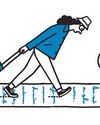
"Jacob Javits of New York is the first United States senator to become fully automated," the Chicago Tribune announced in 1962 from the Republican state convention in Buffalo, where an electronic Javits spat out slips of paper with answers to questions about everything from Cuba's missiles ("a serious threat") to the Cubs' prospects (dim).
"Mr. Javits also harbors thoughts on medical care for the elderly, Berlin, the communist menace," and more than a hundred other subjects, the Tribune reported after an interview with the machine.
Javits may have been the first automated American politician, but he wasn't the last. Since the nineteen-sixties, much of American public life has become automated, driven by computers and predictive algorithms that can do the political work of rallying support, running campaigns, communicating with constituents, and even crafting policy. In that same stretch of time, the proportion of Americans who say that they trust the U.S.government to do what is right most of the time has fallen from nearly eighty per cent to about twenty per cent. Automated politics, it would seem, makes for very bad government, helping produce an electorate that is alienated, polarized, and mistrustful, and elected officials who are paralyzed by their ability to calculate, in advance, the likely consequences of their actions, down to the last lost primary or donated dollar.
This story is from the November 11, 2024 edition of The New Yorker.
Start your 7-day Magzter GOLD free trial to access thousands of curated premium stories, and 9,000+ magazines and newspapers.
Already a subscriber ? Sign In
This story is from the November 11, 2024 edition of The New Yorker.
Start your 7-day Magzter GOLD free trial to access thousands of curated premium stories, and 9,000+ magazines and newspapers.
Already a subscriber? Sign In

NOTE TO SELVES
The Sonoran Desert, which covers much of the southwestern United States, is a vast expanse of arid earth where cartoonish entities-roadrunners, tumbleweeds, telephone-pole-tall succulents make occasional appearances.

THE ORCHESTRA IS THE STAR
The Berlin Philharmonic doesn't need a domineering maestro.

HEAD CASE
Paul Valéry's ascetic modernism.

LOVE FOR SALE
When America tried to get on top of the sex trade.

EACH OTHER'S BACK
\"Nickel Boys.\"

NO ROOM FOR A MASTERPIECE
Rashid Johnson's art of masculine vulnerability is going to the Guggenheim.

THE BATTLE FOR FRANCE
President Emmanuel Macron has plunged the country into chaos.

BOOK A STRESS-FREE GETAWAY
Recently refurbished houseboat. Sleeps four guests comfortably, and many more less comfortably, but it's definitely doable and safe, though no jumping all at once, please.

LEG WORK
A surgeon and an engineer reimagine the prosthetic limb.

BASIC INSTINCT
A feminist director takes on the erotic thriller.